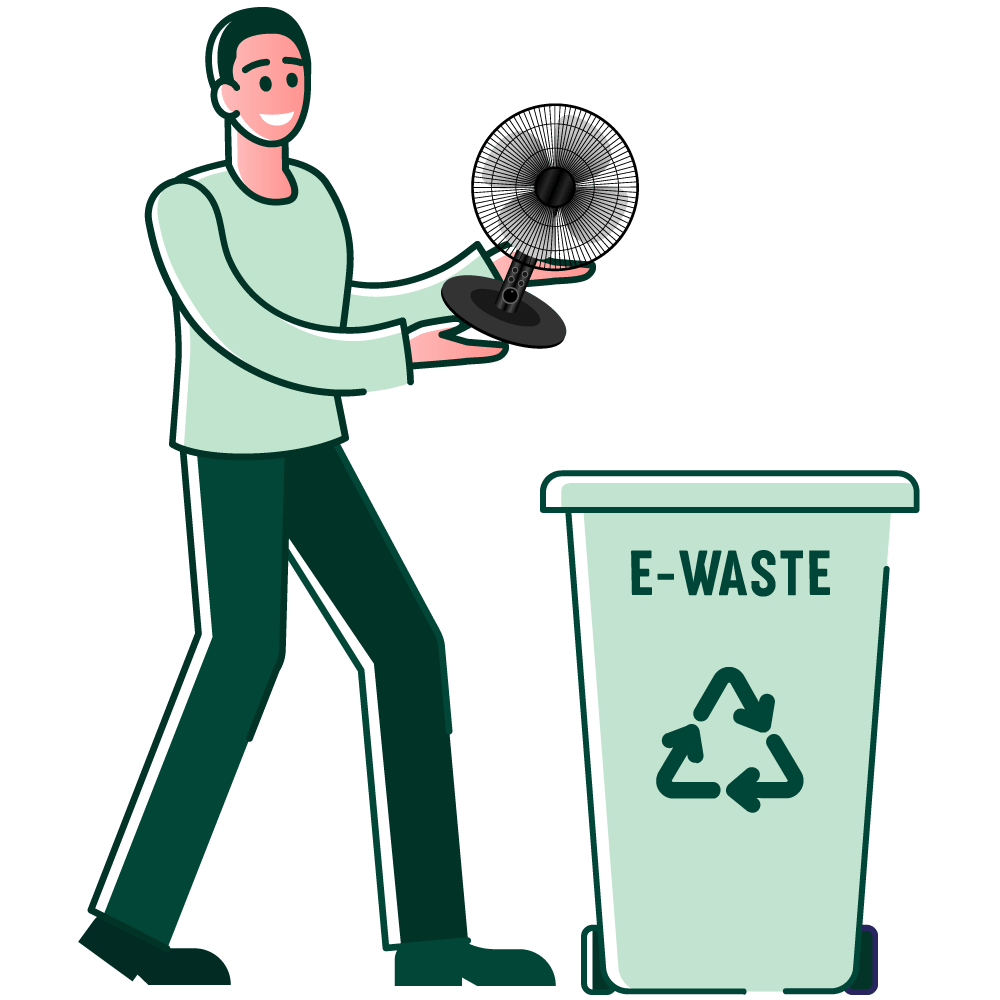How To Recycle Fans?
The answer to if ceiling fans are recyclable is YES! Box, ceiling, stand-up — all kinds of fans are recyclable. Although fan recycling options are limited, there are several ways to safely dispose of fans.
Here’s all the information you need for basic fan recycling knowledge.

Why Should You Recycle Fans?
You should recycle fans for environmental reasons:
Reduce landfill waste - Our landfills are rapidly approaching maximum capacity, and recycling fans help slow this down.
Conserve natural resources - Recycling means fewer resources are used to manufacture new fans.
Removing hazardous materials - Recycling electronics removes dangerous materials and chemicals from the environment.
You should recycle fans for financial reasons:
Creation of new materials - Old materials are converted into new ones through recycling, and companies spend less on obtaining new materials.
Donate - By donating old fans, you assist a family who can’t purchase a fan for the hot summer months.
Earn money - Advertise your fan on local Facebook pages and sell it for a profit if it’s in good shape.
What Materials Can You Retrieve From Fans?
Materials you can retrieve from fans according to their parts are:
| Parts | Retrieved Materials Through Recycling |
| Blade material | Wood, plywood, steel, aluminum, plastic |
| Blade arms | Aluminum, nodular cast iron, cast steel, nickel alloys |
| Flywheel | Metals, plastic, rubber |
| Mechanism for mounting the fan to the ceiling | Metal, plastic, porcelain |
| Downrod | Metal |
| Motor housing | Plastic |
| Switch housing | Metal, plastic |
Overall, the most common fan materials are aluminum, carbon steel, galvanized steel, stainless steel, and plastic (polypropylene). Most of these can be obtained by fan recycling.
How to Recycle Fans?
You can recycle ceiling fans at these places.

E-Waste Recyclers
Fans belong to e-waste, so e-waste recyclers are the best option. They use industrial recycling processes, which ensures as many materials as possible are recovered from the fan with minimal energy spent.

Municipal Waste Management
Some municipalities have waste programs with the necessary facilities and equipment to recycle fans. However, not all states have these, and many municipal waste programs don’t accept electronics because they can contain hazardous materials. This is why e-waste recyclers are a better choice.

Manufacturer/Seller Takeback Programs
Some manufacturers and sellers accept old fans. You can check the manufacturer’s website or contact the seller from which you got the fan and ask if they accept old fans for recycling. Several national chains currently accept fans for recycling, such as Best Buy, Office Depot, and Recycle Nation.

Donation
You can donate old fans to your local Goodwill store, school, and shelters. Schools are always looking for donations, and a fan can be put in a classroom. Check with the school in your city to ask if they need one. Shelters are also great places to donate. You can contact homeless shelters, women’s shelters, emergency, and even animal shelters if they accept donations.

Selling
You can breathe new life into an old fan by reselling it. Place an ad on Craigslist or eBay, and list it on local Facebook community groups, such as yard sales, selling, and others. You can also organize a yard or a garage sale where you decide how much you want for your old fan.
Where to Recycle Fans?
Apart from “are electric fans recyclable”, most people search for “ceiling fan recycling near me.” Here's how to recycle fans no matter where in the US you live.
Drop-off Recycling (For Individuals in the San Francisco Bay Area)
If you live in SF Bay Area, you can recycle fans at our Burlingame EcoCenter. Our address is 1831 Bayshore HWY, Suite 2, Burlingame, CA 94010, USA. We recycle all kinds of electronic items, and you can check if your item falls in the free or paid category.
Note: We charge fan recycling $1.00 per pound.
The employee at our center will accept and weigh your fan, and you can pay using a contactless chip reader.
Business Recycling Pickup (For Businesses in the San Francisco Bay Area)
If you’re a business in the SF Bay Area and you want to dispose of a large number of fans, you can contact us and schedule a collection. Contact our Business Pickup Service and schedule a pickup, which is especially handy if you have large fans.
Here’s how it works:
- Place all the fans you want to be recycled in an empty room or a loading dock.
- There’s no need to wrap the fans.
- Take a picture of the fans you want to be recycled and email it to us. Our employee will give you a quote.
- Confirm the pickup time, and our crew will come and load all the fans.
- We’ll weigh the fans and send you an invoice, and you’ll be notified when the fans have been recycled.
Mail-in Recycling (US-Wide Service)
If you don’t live in the SF Bay Area, you can mail in your fans.
Here’s how to mail your fan:
- Weight your fan and fill in the mail-in form
- Pay the recycling fee online
- Select the shipping company you prefer and send us the fan
- We’ll notify you when we receive the fan
Green Directory (US-Wide Service)
Our Green Directory is a one-stop service for all your recycling needs. Use it to find recycling centers all over the US.
Here’s how to use it:
- Enter fan in the search for bar
- Put in your zip code
- Hit search
You’ll get a list of all recycling businesses that accept fans in your area in seconds, and pick one you like best.
DISCLOSURE *: GreenCitizen is passionate about making every day Earth Day for the people and businesses we serve. We introduce only those green products and services that we believe can help our customers reduce waste and environmental damage. We participate in Amazon Associates and other affiliate programs that earn us fees when site visitors follow certain links. We’re committed to using all such revenues to increase our efforts toward making every day Earth Day.

